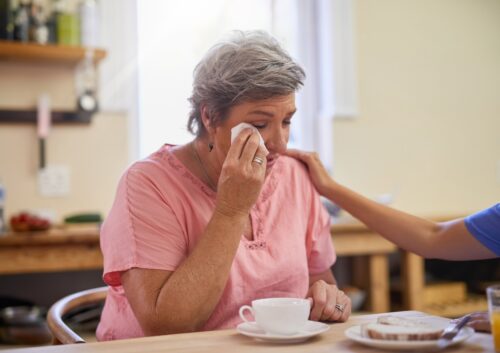If menopause is affecting your close relationships, you could benefit from Relate’s one session therapy fully funded through GroceryAid. The changes brought on by menopause can affect everyone, including those close to you, such as your partner, children, friends and work colleagues. Seeking help can improve communication and understanding for everyone involved, helping you navigate the symptoms and effects.
What is menopause?
Menopause is when your periods stop due to lower hormone levels. Symptoms may include mood swings, anxiety, stress, brain fog and hot flushes or changes in sexual function. Most people go through menopause between 45 and 55, but for some it can happen as early as their 30s. Menopause is being spoken about publicly, but it remains a ‘taboo’ subject for many people.
Menopause and self-esteem
Menopause is often associated with ageing and some may struggle with the idea of moving into this phase of their life. Changes in their appearance, such as less supple and smooth skin, tiredness and weight gain as well as changes in libido can impact how someone feels about themself.
Menopause and stress
Challenges due to physical and emotional changes, family demands, work-life balance, and sexual function/relationships can lead to stress and anxiety. Seeking support can make a big difference in how you cope. You don’t have to go through this alone.
Attitudes to menopause
These days, someone who is going through menopause can expect a third of their life to be post-menopausal. So it’s essential to explore their own attitudes and beliefs regarding menopause if they are to enjoy a full, healthy and respectful relationship. The idea that the menopause signals the end of the sexually active years is losing ground.
Menopause and relationships
Knowledge of menopause
Some men may feel that the menopause is ‘women’s business’ and that there is no need for them to be informed or even involved. Trying to understand your partner can be hugely beneficial to both people in the relationship, as well as the wider household. Working together, partners can address the changes that are happening at this meaningful time in life.
Change in sex drive
For some, menopause brings with it a sense of sexual liberation and over 50% of menopausal people report no decrease in libido. However, where there is a change, partners can feel rejected, and this can cause a physical and emotional distance between them.
Coping with mood swings
This is a time when understanding and patience are required. It’s useful for partners to recognise that mood swings, distress and anxiety may not be anything to do with them and not take it personally. Empathy and understanding, and simply being there is of huge support.
If you or someone close to you is going through menopause, and you think you could benefit from some support with your relationships, GroceryAid provides funded counselling and support for grocery colleagues from their very first day in the industry. Through our partnership with Relate, you can apply for a range of services including couples counselling, sex therapy and family counselling.
Learn more at: groceryaid.org.uk/emotional/emotional-counselling-relationship/




